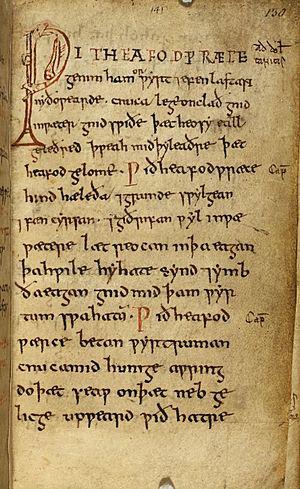Lacnunga facts for kids
The Lacnunga is an old collection of medical texts and prayers from Anglo-Saxon times. It was mostly written in Old English and Latin. The word Lacnunga means 'remedies' in Old English. This name was given to the collection by an editor in the 1800s, as it wasn't in the original book.
What is the Lacnunga?
The Lacnunga is found in a special old book called London, British Library Harley MS 585. This book was probably put together in England around the late 900s or early 1000s. Many of the plant-based remedies in Lacnunga are also found in a similar old medical book called Bald's Leechbook.
Unique Charms and Spells
The Lacnunga contains many texts you won't find anywhere else. These include many charms. These charms give us a rare peek into the popular beliefs and healing methods of the Anglo-Saxons.
Some of the charms are like poems in Old English. They use a special kind of rhyming called alliterative verse. The most famous ones are:
- For Delayed Birth (a charm to help with childbirth)
- The Nine Herbs Charm (a charm using nine different plants)
- Wið færstice (meaning 'Against a sudden, stabbing pain')
There are also some charms written in an old form of Old Irish.
Protective Prayers
Among the Latin prayers in the Lacnunga, the longest one is a version of the Lorica of Laidcenn. This is a very old Irish poem from the 600s. It's a type of protective prayer called a lorica.
This prayer asks Christ and many angels to protect different parts of the speaker's body from demons. In this old book, the prayer also has an interlinear gloss. This means there are Old English words written between the lines of the Latin text to explain it. This Old English explanation probably came from a copy written in the Mercian dialect.
Studying the Lacnunga
Scholars have studied and translated the Lacnunga over the years. These studies help us understand more about Anglo-Saxon medicine, beliefs, and language. You can even see a digital copy of the original book on the British Library website.


